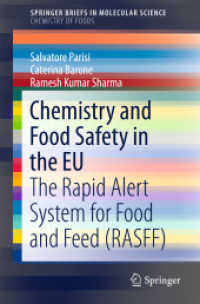Full Description
The book is a critical examination of the complex role of writing in court-involved young adults' lives. The purpose of this book is to provide an in-depth look at how writing might possibly be the best opportunity to give students multiple tools to deal with their circumstances in life: to give them a voice to express themselves; an opportunity to recognize their strengths; a way to document their aspirations; and chance to give them hope. Furthermore, this book will advocate for literacy instruction that is grounded in research, and will advocate for youth to be creative meaning-makers, and finally this book will underscore the power of writing as a way to amplify beliefs and life experiences. This book includes current research that supports a framework for teaching writing, particularly for those youth who are marginalized and disenfranchised, while considering the meaning of equity in education.
Contents
Acknowledgments
Introduction
Chapter 1: The Myth of the Struggling Writing
Chapter 2: Reading like a Writer
Chapter 3: Shying Away from Sad: Identity and Writing
Chapter 4: "Sometimes Gun Violence is 'Good'"
Chapter 5: The Art of Composing and Re-conceptualizing Writing
Chapter 6: Risky Endeavors
References
About the Author







